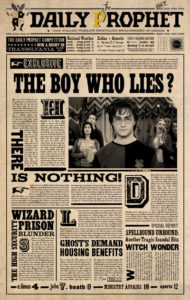Harry Potter and the Goblet of Ethics
Published on December 4, 2018, at 11:35 a.m.
by Emily Hillhouse.
From the importance of fighting evil, to the value of friendship, to the idea that there’s a place for everyone in this world, J.K. Rowling teaches readers a myriad of lessons throughout the seven books and 4,224 pages total in the “Harry Potter” series.
What consumers of media, including public relations practitioners, may also take away from “Harry Potter” are the many lessons in ethical communication found throughout this series, particularly books four and five. With no wizarding equivalent to our own Society of Professional Journalists, the state of ethics in journalism is quite dismal in this magical world.
The main newspaper for English wizards in the “Harry Potter” universe is the Daily Prophet, which has a monopoly over this market. With no competition, the publication has a protected status that its reporters and lead decision-makers frequently abuse.
While the Daily Prophet’s shortcomings might lead you to believe the “Harry Potter” series is anti-media, this is not the case. Rather, these missteps provide communicators with examples of what not to do in real-world situations, like dealing with sources and sensitive information.

Don’t be willing to do anything for a story
First, let’s examine the character of Rita Skeeter, who is introduced in the fourth book, “Harry Potter and the Goblet of Fire.” This Daily Prophet reporter is notorious for embellishing her stories to the point of fiction. When she covers the Triwizard tournament at Hogwarts School for Witchcraft and Wizardry, she exploits the death of Harry Potter’s parents to paint him as a “tragic hero.” When she doesn’t get the kind of information she wants from a source such as Potter, she simply attributes quotes to him that he never said.
Skeeter also uses her status as a reporter to bully others for personal reasons. She illegally transforms into a beetle to overhear private conversations, and when she learns a teacher at the school is half-giant, she almost ruins his career by exposing him due to her prejudice. After Harry’s friend Hermione points out the reporter’s dishonesty, Skeeter writes a scathing article in which she accuses the 14-year-old of having a “taste for famous wizards,” falsely portraying her as a “scarlet woman” and referring to her Yule Ball date as her “latest prey.” Once published, Daily Prophet readers send Hermoine hate mail and threats for weeks.
All communicators in the fields of journalism, public relations and beyond should avoid sensationalism as practiced by Skeeter. When talking to sources or writing about people, you should never come into the situation with such strong, predisposed ideas that you are willing to fabricate information just to get the story you want. And, most importantly, you should never be unjustly mean. This idea is outlined in the “minimize harm” principle of the Society of Professional Journalists’ Code of Ethics, which states that “ethical journalism treats sources, subjects, colleagues and members of the public as human beings deserving of respect.”

Don’t fall to corruption
In the next book, “Harry Potter and the Order of Phoenix,” the Daily Prophet ups the ante on its unethical behavior by abandoning its responsibility to remain independent and instead serves as a puppet for the Ministry of Magic, the wizarding world’s equivalent to the British government.
For background, Lord Voldemort is an evil wizard who 14 years prior had tried and failed to establish a reign of terror over the world with pure-blooded wizarding families at the top. At the end of the fourth book, he rises again; but only his supporters and Harry Potter witness his rebirth. The rest of the wizarding world still believes him to be dead. For a majority of the fifth book, the Ministry would like to keep it that way.
The Daily Prophet becomes complicit in the Ministry’s ill-sighted attempts to keep everyone calm at the expense of the truth. While it remains unclear if the Ministry is bribing Daily Prophet Editor Barnabas Cuffe, or if Cuffe simply forsakes integrity for loyalty to Minister Cornelius Fudge, the result of this unethical partnership remains the same.
Throughout this book, the Daily Prophet refuses to report on violence linked to Voldemort, despite it being in the public’s best interest to stay safe. It also contributes to the Ministry’s smear campaign of Harry Potter by accusing him of lying about evil wizard’s return for attention. It continues to take opportunities with each new edition to ridicule Potter in stories that have nothing to do with him. For example, writers use his name as a term meaning anyone who tells an unbelievable story. Because of the Daily Prophet’s reach, most wizards believe Potter to be a liar, and Voldemort is allowed to continue plotting his attacks in secret.

The Daily Prophet also lies for the sake of covering up Potter’s claims, despite being corroborated by the most respected wizard of the time, Albus Dumbledore, head of Hogwarts. When Dumbledore announced Voldemort’s return, he was voted out of his position as Chief Warlock of the Wizard’s High Court. The Daily Prophet, however, tells readers he lost his position due to him “getting old and losing his grip.” This baseless claim was simply a shady attempt at discrediting him in the eyes of the public, thus further discrediting Potter’s story.
Due to its indifference to accuracy, the Daily Prophet serves as a perfect antithesis for the SPJ Code of Ethics principle “Seek Truth and Report It.” The Daily Prophet publishes a majority of its information during this period from anonymous and vague sources, which according to this principle is unethical, because the public is “entitled to as much information as possible to judge the reliability and motivations of sources.” Daily Prophet reporters also never seek to allow Harry Potter or Dumbledore the opportunity to respond to the many criticisms it publishes in regard to their character.
What’s the point?
For those who work in the communications industry or who understand media ethics, the rampant corruption from Britain’s only mainstream wizarding newspaper might be frustrating to read. However, if you fall into this category, you will be pleased to know that J.K. Rowling makes sure to highlight the repercussions the Daily Prophet eventually faces.
While some longtime Daily Prophet readers boycott the publication in support of Harry Potter in the beginning, the Daily Prophet faces real damage to its credibility after Voldemort appears at the Ministry at the end of the fifth book. While the Daily Prophet ignores previous reporting and announces the return of Voldemort as if it was the first to know, many see through the newspaper. This includes Professor Slughorn, a character who holds a lot of respect for those in power and would normally be the type to support the Daily Prophet. By the sixth book, “Harry Potter and the Half-Blood Prince,” he says, “One doesn’t know what to believe, the Prophet has been known to print inaccuracies, make mistakes.”
At a later point in the series, the Daily Prophet falls to Voldemort. Once Voldemort is defeated, however, it is assumed that the new, respectable Minister of Magic recovers the Daily Prophet, allowing it to become what it should have been all along — an unbiased source of news and information for British wizards.
Among the many values you may pick up from reading “Harry Potter,” J.K. Rowling uses the failures of the Daily Prophet to teach integrity, rather than bash the media for “fake news.” Integrity is doing what’s right, even when no one is watching. Although it may seem like those in power, whether they be in the government or in the media, will get away with unethical behavior, in the end, good always defeats evil.




